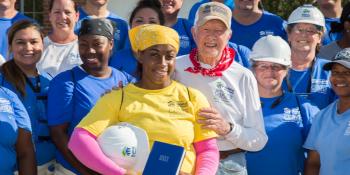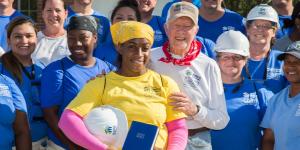Honoring a legacy
Your donation will help Habitat honor President Carter’s legacy by continuing to work towards our shared vision of a world where everyone has a decent place to live.
Your donation will help Habitat honor President Carter’s legacy by continuing to work towards our shared vision of a world where everyone has a decent place to live.
President Carter’s Habitat legacy lives on in the countless volunteers he inspired.
Late in the afternoon on the last day of building, Bill Metzger and his fellow volunteers were exhausted. A week of lifting heavy blocks in the tropical heat of the Philippines had taken a toll, and though the house they were working on wasn’t completely finished, they felt they’d reached their limits.
“But here comes the president walking down the road,” Metzger recalls. “And he stopped at my place with his entourage, and he looks at me, and he says, ‘Do you have your toilet in?’”
Metzger said no, and Carter offered to show him how.
“So he goes into the house, says, ‘Mix up some mortar,’ and I mixed up the mortar. He takes the toilet, he sits it on the mortar, takes the level and levels it both ways. He knew my son was working next door, so he said, ‘That’s the way you do it; now have your son do the same thing.’ And he walks out.”
Bill pauses. “Seventy-five years old, on his hands and knees, setting that toilet. That’s why I’m here.”
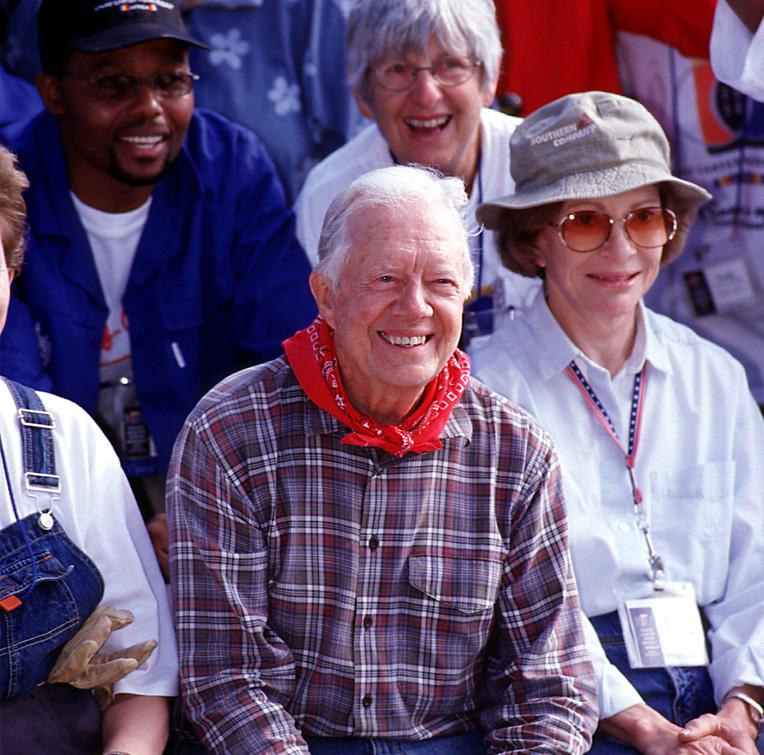
President Carter possessed carpentry skills and certainly put in his fair share of hours on the build site. Generally speaking, however, the enormous groundswell of admiration and respect he inspired in Habitat volunteers stemmed from something more elemental: He was one of them.
By eschewing the separation of celebrity to build with volunteers in the hot, messy, frustrating glory of the build site, Carter was able to inspire, nudge and instruct.
He and Mrs. Carter went where the need was greatest: the hidden hollows of Appalachia, earthquake-ravaged Haiti, a quiet street in South Korea where families wrestled with high costs, an empty spot in South Africa unwanted by the “haves” but eagerly adopted by the “have nots.”
The Carters illustrated, with joy and dedication, the idea that everyone can play a part in creating a world where everyone has a decent place to live.
Each Habitat volunteer creates a legacy — with every nail pounded, every letter written, every dollar donated. Carter’s legacy lives not only in the houses he helped build, but in the volunteers he inspired to follow his example.
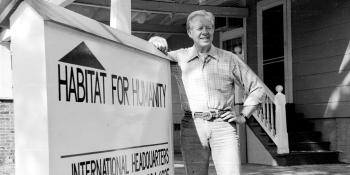
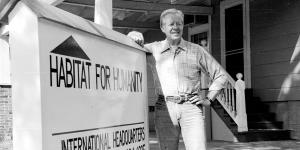
Hear from homeowners and volunteers who worked alongside President Carter and learn more about all he helped Habitat accomplish.
Longtime Habitat volunteer David Letterman shares his thoughts on how the Carters influenced and inspired him.
Longtime Habitat for Humanity volunteer David Letterman joined the Carters on the build site during the 35th Jimmy & Rosalynn Carter Work Project. During the event’s opening ceremonies, he welcomed the Carters to his home state of Indiana and shared these thoughts on how they influenced and inspired.
“In my life, I have always struggled and envied people who have figured out a way to make a difference in the world, people who know how to ‘move the needle.’
“I would not have known to call Habitat for Humanity if it wasn’t for President Carter and Rosalynn Carter. It’s because of these two people that my friends and I were able to find a way to help in a very, very small way.
“I am blessed to be here today with the President and his wife because they have become in their lives a beacon — a beacon to show you what needs to be done and how it can be done.
“They changed my life.”
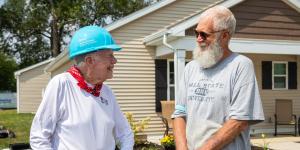
As we celebrate the life of our most famous volunteer, hear how he described what Habitat for Humanity meant to him.
Hear how President Carter described what Habitat for Humanity meant to him in this video.
Those fortunate enough to ever hear President Carter talk about his work with Habitat often saw him do it with a smile on his face and tears in his eyes.
When he was on site, he wanted to build because he enjoyed the tasks — but also because he understood that change could have a blueprint, just like any other construction project. Driving a nail was steering a future. Raising a wall was sounding a call.
The beauty of his spirit, however, was that he never allowed these ideas to become mere abstractions. He was simply pitching in, standing shoulder to shoulder with someone who needed a hand, someone very much like him.
“We’re all the same folks,” he once said. “We all want the same for our children — a better life, one that’s filled with excitement and challenge and hope and self-respect, a better prospect for the future.”

President Carter’s support of Habitat was an expression of his deeply held Christian beliefs.
From a young age, Jimmy Carter watched both his parents faithfully attend church services and put the Christian values of fairness, discipline and compassion to work on their farm and in their community.
As Carter moved through life — from the farm to service in the U.S. Navy, then through business, the White House and humanitarian work — the lessons of faith he absorbed at an early age crossed the boundaries of race, income and gender. Beginning in 1984, those lessons found a practical outlet in Habitat for Humanity.
Carter’s involvement with Habitat was an exercise in breaking boundaries in the name of his faith. “I look on Habitat for Humanity as a movement for reconciliation, a breaking down of barriers between people who might be different,” he said at the 2001 Jimmy Carter Work Project in Asan, South Korea.
“We learn about service, we learn about love, and we talk about it. But Habitat lets us put it all into practice.”— President Jimmy Carter
An enduring faith in the love of God for everyone enabled him to work with joyous Habitat homeowners and volunteers with the same straightforward authenticity he employed with foreign heads of state.
The pragmatic details of his work — the blocks laid just so, the joints precise and tightly fitted — hinted at the profound motivations of faith and service that characterized his support for Habitat.
“From my rural boyhood, when I often spent the night with black neighbors who lived in unheated and dilapidated shacks, to my years in the White House when I saw the plight of the homeless and those trapped in poverty housing worldwide, I have known that shelter matters,” he said. “And I know, as a Christian, that I have a responsibility to serve where I can.
“Jesus was a carpenter, and a builder. Through Habitat, we have been privileged to become builders, too, not only of houses, but of families, lives and hope.”
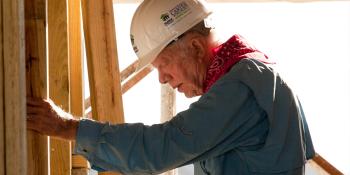
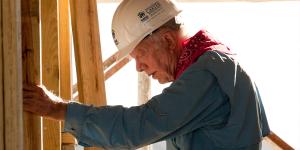
Homeowners who built alongside President Carter remember a man who gave his all on the build site.
There was always a special connection between the Carters and the homeowners who live in the houses they helped build.
For many of those homeowners, it may be one of the first housing experiences of their lives in which they feel not simply like a social security number or the latest in a long line of struggling renters, but a person with a name and a future. For Carter, getting to know the homeowners was a cherished part of his own personal growth.
“I think every human being has within himself or herself a desire to reach out to others and to share some of our blessings with those who are in need,” Carter once said. “But it’s one of the most difficult things to do.
“I haven’t been on a Habitat project that I wasn’t thrilled and inspired, and wept.”— President Jimmy Carter
“What’s opened up that avenue for me and my wife and hundreds and thousands of others is Habitat for Humanity. It makes it easy for us to reach out and work side by side with the homeowner who’s never had a decent house, perhaps,” he continued, adding, “I haven’t been on a Habitat project that I wasn’t thrilled and inspired, and wept.”
The homeowners so often shared in those emotions. During the 1999 Carter Work Project in the Philippines, as Carter built concrete-block walls in the tropical heat, homeowner Leonisa noticed that drops of his sweat were falling into the mortar. This sight — in light of the years she and her family endured in a bamboo shack — overwhelmed her, and she cried. “Too much blessing from the Lord,” she said.
During the 2002 build, Mambo worked with Carter on his house in Durban, South Africa. The next year, he traveled to Anniston, Alabama, to work with Carter again, this time building a house for someone else. Though the surroundings were different, Carter was the same “humble and down-to-earth” volunteer Mkhize had met previously. “I never expected him to come and help me in South Africa,” he says. “What I knew about big people like him — we are here to serve them, not them to serve us.”
In 2005, Carter made a statement at the project in Michigan that seemed to encapsulate much of his perspective toward the homeowners he had built with through decades of involvement with Habitat.
“In every home in which we worked for Habitat, no matter where it is, we have found the homeowner families are just as intelligent and just as hard-working and just as ambitious, and their family values are just as good as mine,” Carter said. “I hope during the week that we work side by side with them, that they learned to respect us as equals. Not as superiors, but as equals.”

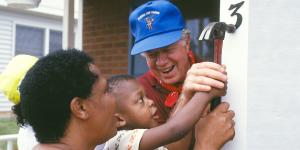
Habitat CEO Jonathan Reckford reflects on the lasting impact of President Carter’s life of service.
When President Carter passed away, Habitat for Humanity lost one of our leading voices and one of our most tireless volunteers.
During my first Carter Work Project, a homeowner shared a sentiment that sums up as well as anything why we do what we do. Outside Mumbai, India, during a joyful house dedication, a man named Aziz draped his arm across the shoulders of one of his new neighbors and said, “We come from different faiths and castes, but now we are brothers.”
It is a memory I carry, and I have met so many Habitat volunteers and supporters who certainly seem to have similar touchstones.
“The leadership he invested in Habitat for so many years does not end here. It will simply continue to flourish, not only in the changed lives of the families with whom we partner, but in the changed hearts of all of us who build.”— Jonathan Reckford, Habitat for Humanity CEO
In volunteering with and supporting Habitat for more than 35 years — and through their work with The Carter Center — President and Mrs. Carter brought people together on so many levels.
They were true friends to this ministry and staunch advocates for people everywhere who suffer from poor health and housing, from political oppression, and from the enormous pressures that poverty imposes. They also were the deepest inspiration for countless others who have engaged in our mission, picking up everything from hammers to telephones in the name of affordable housing.
One of President Carter’s greatest gifts to Habitat was his servant commitment. His international profile brought enormous attention to both the need for and the value of the work that Habitat does. But Carter didn’t simply choose to stand in the spotlight that followed him.
Through the years, he slept in tents on Habitat build sites, worked in the heat and cold, took photos with volunteers in torrential downpours, and his spirit never faltered. I am grateful for his example and for his longstanding commitment to Habitat. We will miss him terribly.— Jonathan Reckford, Habitat for Humanity CEO
And yet, the seeds he sowed while he was alive — seeds of awareness, of dedication and compassion — have only just begun to bear fruit. The leadership he invested in Habitat for so many years does not end here. It will simply continue to flourish, not only in the changed lives of the families with whom we partner, but in the changed hearts of all of us who build.

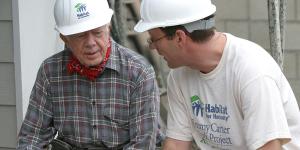
President Carter called Habitat a “singular, divine concept that has opened a vision to me.”
In 1991, President Carter called Habitat for Humanity “a singular, divine concept that has opened a vision to me.”
That vision — a world of housebuilding people helping each other and themselves — took him to build sites across the United States and around the world.
For more than three decades, President and Mrs. Carter worked alongside those who had also glimpsed the possibility of a world where everyone has a decent place to live.
